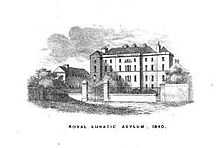Richard Poole
Richard Poole (1783 – 1871) was a Scottish physician,[1] psychiatrist, and phrenologist.[2]
Life
Poole was born in Edinburgh, though from an English background.[3] He graduated M.D. at the University of St Andrews in 1805.[1] He was editor of the New Edinburgh Review (19th century)|New Edinburgh Review, and published articles promoting phrenology in it, in the early 1820s;[4] it existed 1821 to 1823.[5] Poole was also first editor of the Phrenological Journal.[6] Poole joined the editorial staff of the Encyclopædia Edinensis under James Millar.[7]

From 1820 Poole campaigned for a new infirmary in Edinburgh.[8] In 1825 he was elected a Fellow of the Royal College of Physicians of Edinburgh.[3] In the late 1830s he was a pioneer advocate of mental health reform,[9] and in 1838 he became superintendent of the Montrose Asylum, succeeding W. A. F. Browne. He remained at Montrose until 1845. He then kept a private asylum at Middlefield, Aberdeenshire.[3]
Poole died at Coupar Angus.[3]
Works
- An Essay on Education (1825).[10] In this work, from the Encyclopædia Edinensis, Poole acknowledges help in early life from Archibald Alison. He advocated education in cases of mental retardation.[11]
- A Letter to Andrew Duncan, Senior, M.D. ... Regarding the Establishment of a New Infirmary (1825).[12] Pamphlet addressed to Andrew Duncan, the elder on the infirmary question; Duncan replied to the agitation for a new infirmary in a letter to William Fettes.[13]
- Report on Examination of Medical Practitioners (1833)
- Memoranda regarding the Royal Lunatic Asylum, Infirmary, and Dispensary, of Montrose (1841)[14]
He is credited with dramas, including "Willie Armstrong" performed in Edinburgh in 1829.[15][16]
Poole also wrote for the Edinburgh Encyclopædia and Encyclopædia Britannica.[3] A list of publications appeared in Scottish Notes and Queries.[17]
Family
An epitaph gives Jane Caird as Poole's wife; it also records his dates as 1781 to 1870.[18] Their children included Samuel Wordsworth Poole, a physician and episcopal clergyman.[19]
Notes
- ↑ 1.0 1.1 Roger Cooter (1984). The Cultural Meaning of Popular Science: Phrenology and the Organization of Consent in Nineteenth-Century Britain. Cambridge University Press. p. 314 note 66. ISBN 978-0-521-22743-8. Retrieved 19 May 2012.
- ↑ Roger Cooter (1984). The Cultural Meaning of Popular Science: Phrenology and the Organization of Consent in Nineteenth-Century Britain. Cambridge University Press. p. 42. ISBN 978-0-521-22743-8. Retrieved 19 May 2012.
- ↑ 3.0 3.1 3.2 3.3 3.4 UM-MEDSEARCH Gateway (1870). The Lancet. J. Onwhyn. pp. 467–8. Retrieved 19 May 2012.
- ↑ Hewett Cottrell Watson (1836). Statistics of phrenology: being a sketch of the progress and present state of that science in the British Islands. p. 194. Retrieved 19 May 2012.
- ↑ James J. Sack (27 May 1993). From Jacobite to Conservative: Reaction and Orthodoxy in Britain, C. 1760-1832. Cambridge University Press. p. 19. ISBN 978-0-521-43266-5. Retrieved 19 May 2012.
- ↑ http://www.deepdyve.com/lp/pubmed-central/phrenology-and-british-alienists-c-1825-1845-part-i-converts-to-a-Z0fYl0MyTV at p. 5 or 6.
- ↑ James Millar, Encyclopedia Edinensis; or, Dictionary of arts, sciences, and literature vol. 1 (1827), p. vi; archive.org.
- ↑ Charles W. J. Withers (4 October 2001). Geography, Science and National Identity: Scotland Since 1520. Cambridge University Press. p. 170. ISBN 978-0-521-64202-6. Retrieved 19 May 2012.
- ↑ http://www.ncbi.nlm.nih.gov/pmc/articles/PMC2629162/ note 96
- ↑ Richard Poole (1825). An essay on education, applicable to children in general;.. Waugh and Innes. Retrieved 19 May 2012.
- ↑ Journal of psychological medicine. 1855. p. 587. Retrieved 19 May 2012.
- ↑ Richard Poole; Andrew Duncan (1825). A Letter to Andrew Duncan, Senior, M.D. ... Regarding the Establishment of a New Infirmary. Archibald Constable. Retrieved 19 May 2012.
- ↑ The Lancet. Elsevier. 1827. pp. 416–8. Retrieved 19 May 2012.
- ↑ Richard Poole (1841). Memoranda regarding the Royal Lunatic Asylum, Infirmary, and Dispensary, of Montrose. J. & D. Nichol. Retrieved 19 May 2012.
- ↑ Ralston Inglis (1868). The Dramatic Writers of Scotland. G.D. Mackellar. pp. 95–. Retrieved 19 May 2012.
- ↑ Percy Bysshe Shelley (1829). The Edinburgh literary journal: or, Weekly register of criticism and belles lettres. Ballantyne. p. 42. Retrieved 19 May 2012.
- ↑ John Bulloch, John Alexander Henderson (editors), Scottish Notes and Queries (1888), p. 40; archive.org.
- ↑ Alexander Macdonald Munro, Records of Old Aberdeen vol. 2 (1909), p. 248; archive.org.
- ↑ David M. Bertie (2000). Scottish Episcopal Clergy, 1689-2000. Continuum International Publishing Group. p. 403. ISBN 978-0-567-08746-1. Retrieved 20 May 2012.